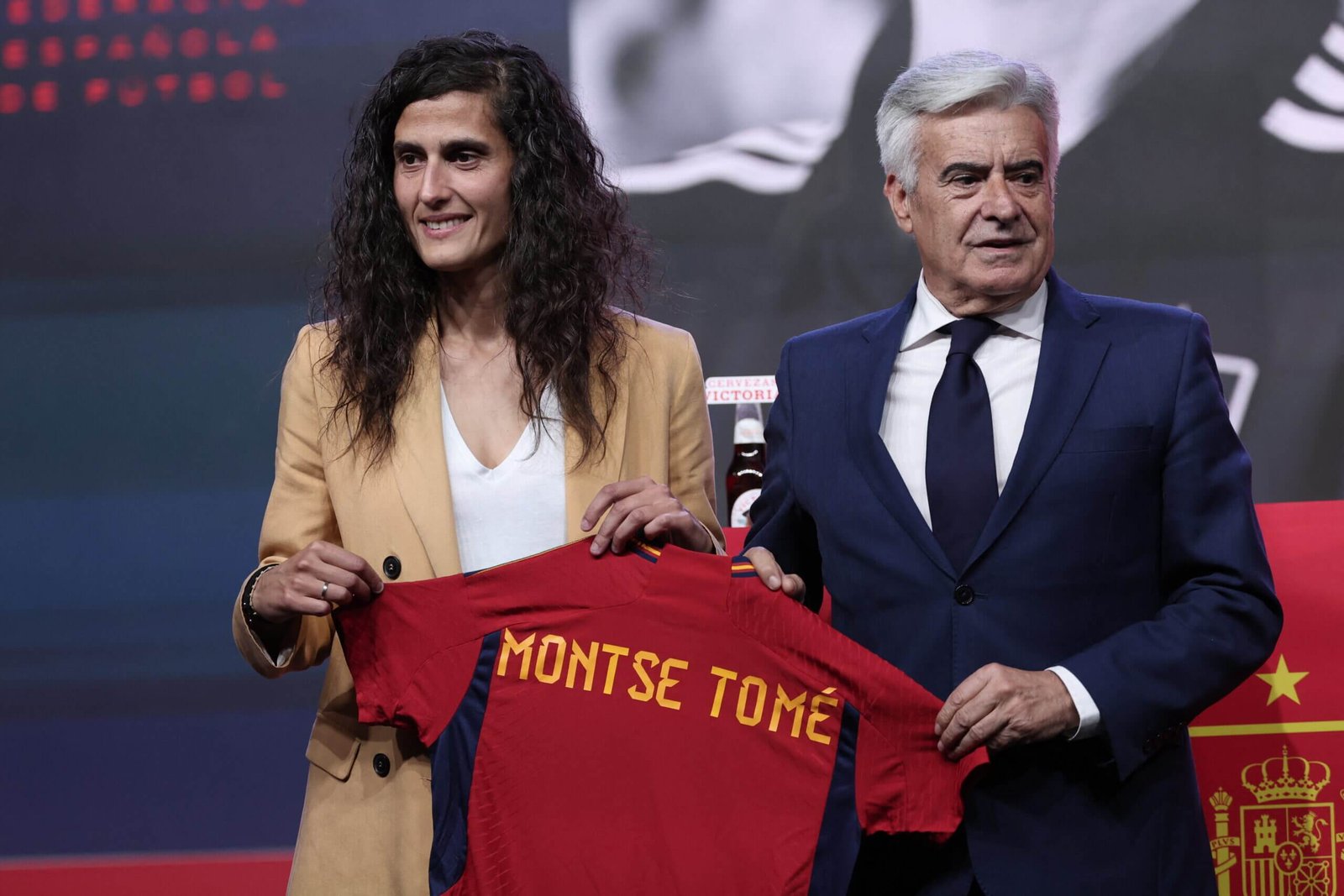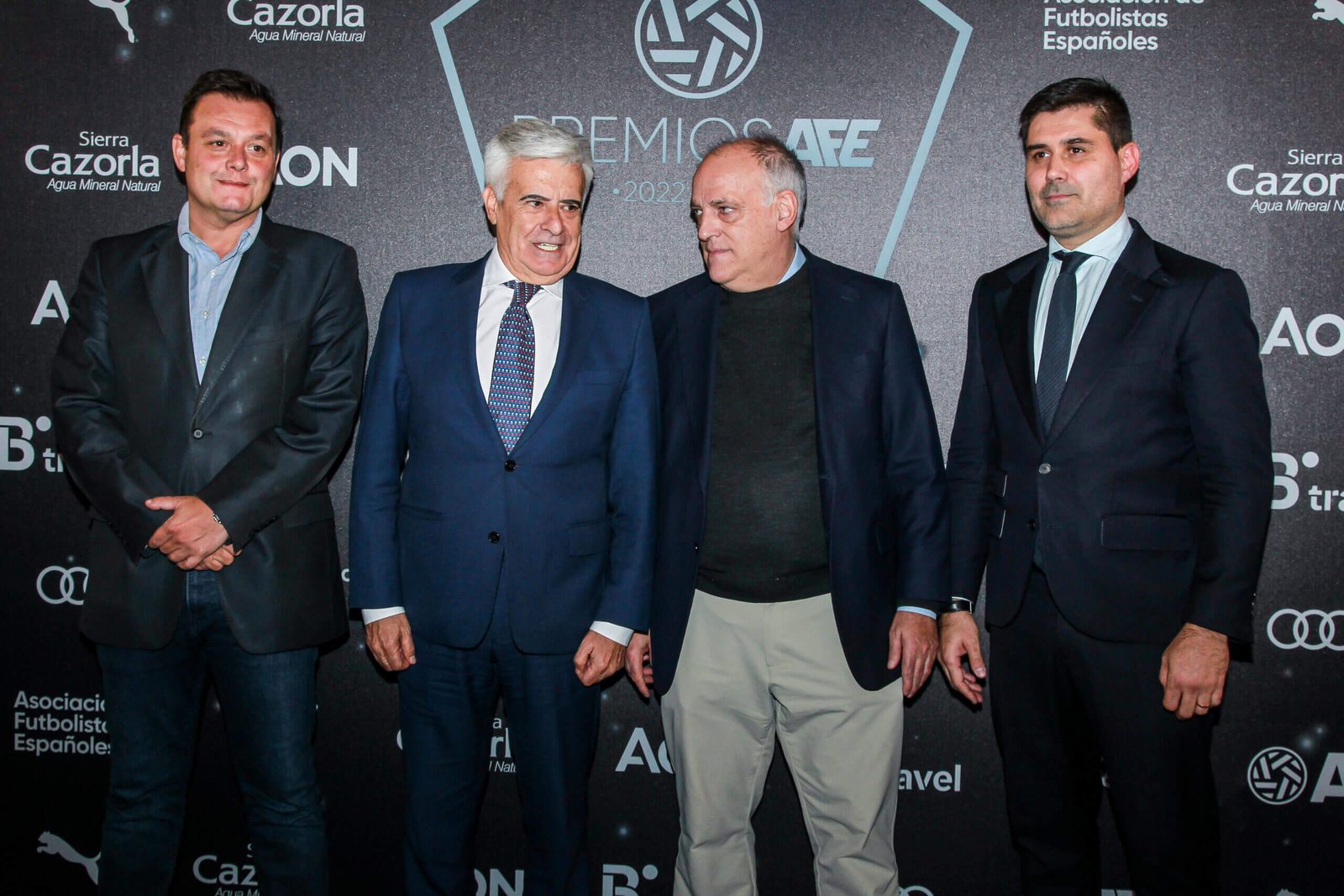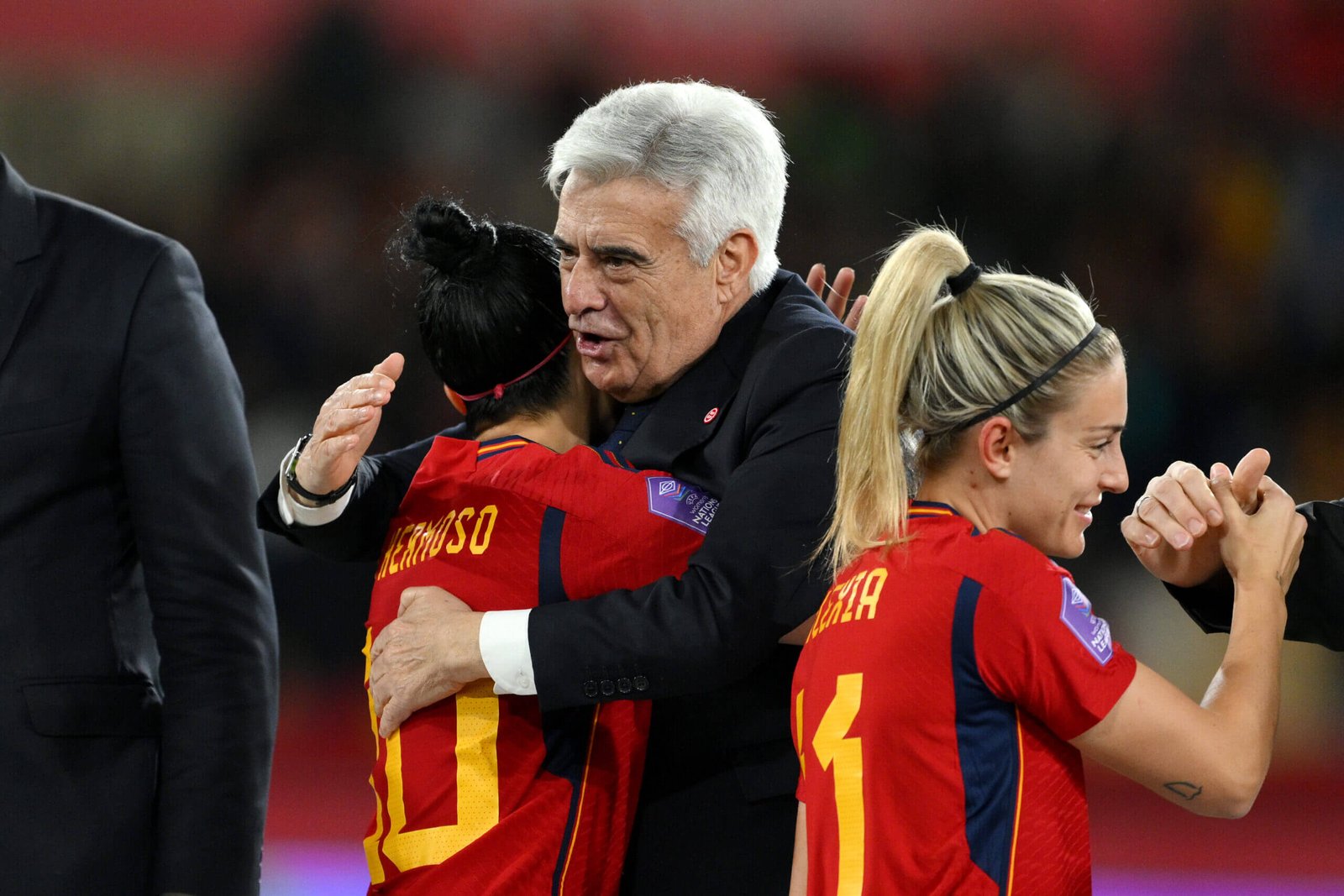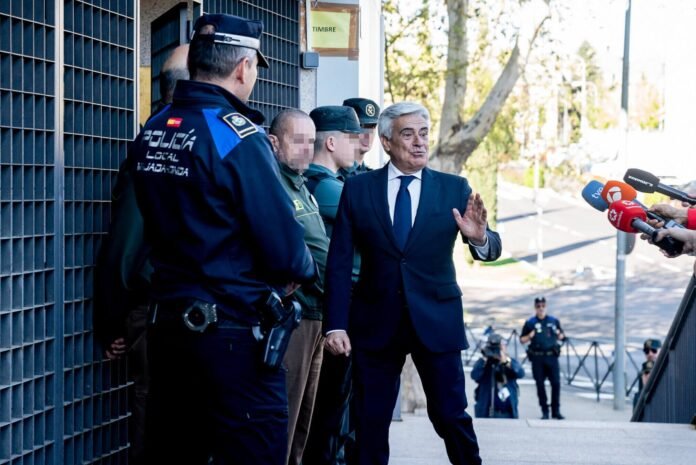It has been a busy week for Spanish football.
Sunday’s Clasico saw Real Madrid set one hand on the La Liga trophy after a thrilling 3-2 win over Barcelona, with Carlo Ancelotti’s side now preparing for a Champions League semi-final against Bayern Munich.
La Liga president Javier Tebas has been talking about staging games in the United States, while a noisy debate continues about introducing goal line technology after the ‘phantom goal’ by Lamine Yamal at the Bernabeu. Barca coach Xavi has changed his mind and after being set to leave at the end of the season, will now stay on at the club next campaign.
But by the end of the week, many headlines were about the government intervening in the Spanish Football Federation (RFEF) to try and clean up the mess still flowing from the exit of former president Luis Rubiales, after his behaviour at last summer’s Women’s World Cup.
Thursday saw the Spanish government’s Superior Sports Council (CSD) announce a new ‘commission of supervision, normalisation and representation’ to work with the RFEF to “initiate a stage of regeneration under a climate of institutional stability”.
But less than 24 hours later Pedro Rocha — handpicked by Rubiales as his successor — was formally named the new president, despite being one of several individuals under judicial investigation in a case examining alleged corruption during Rubiales’ reign at the RFEF.
Here, The Athletic explains the latest on a familiar theme — chaos in Spanish football governance.
What happened to all the talk of reform?
Amid the global uproar that followed Rubiales’ kiss on Jenni Hermoso after Spain won the Women’s World Cup in August 2023, the Spanish government spoke loudly about root and branch reform, while many in Spanish football and society called for a new era of respect and transparency.
The Spanish court system has brought charges of alleged sexual assault and coercion against Rubiales related to that incident in Sydney. Former Spain women’s head coach Jorge Vilda, ex-RFEF marketing manager Ruben Rivera and former RFEF men’s national team director Albert Luque also face charges of coercion. All of the men have denied any wrongdoing. Hermoso has testified that the kiss was not consensual, and that attempts were made to force her into saying the opposite.
Rubiales grabs Hermoso by the head and kisses her on the lips (Noemi Llamas/Eurasia Sport Images/Getty Images)
However, within the world of football, very little was done. It was actually FIFA who moved to first suspend Rubiales, and then ban him from football for three years. The only major changes at the RFEF were forced by Hermoso and her team-mates, when a players’ strike led to the sacking of general secretary Andreu Camps, integrity director Miguel Garcia Caba and communications director Pablo Garcia Cuervo in September.
Many of Rubiales’ close associates continued in powerful roles at the RFEF’s headquarters at Las Rozas just outside Madrid, including Rocha as interim chief, as well as all-powerful legal advisor Tomas Gonzalez Cueto.
Did the government not announce a reform process?
They did, but it went nowhere.
The Spanish government spent much of the autumn reviewing the clientelism that allowed Rubiales such a powerful grip on the RFEF’s internal mechanisms and finances. Five key areas of change were identified — democracy, governance, gender equality, transparency and more places for disabled sports.
Such reform was difficult because, under Spanish law, changes to the RFEF system would be implemented across all sports from football and basketball, to rowing and archery. Spanish Olympic Committee president Alejandro Blanco — another strong past ally of Rubiales — was among the powerful figures opposing any interference in their fiefdoms.
So after months of deliberation, only very minor changes were proposed. Importantly, Spanish football’s regional federation presidents (often referred to as ‘barons’ due to the medieval nature of the system) retained their influence. The same 140 assembly members from Rubiales’ era were to vote for his replacement.

Rocha and Montse Tome pictured at her presentation as new Spain boss (Thomas Coex/AFP via Getty Images)
As the debates and arguments over institutional reform dragged on, Rocha and those around him took advantage to secure their positions.
Big decisions were also made, such as hiring and firing senior RFEF staff and extending the contract of national men’s coach Luis de la Fuente. Rocha also took over the €675,671 (£579k; $725k at current rates) annual salary Rubiales had awarded himself.
Bridges were mended with La Liga by the RFEF withdrawing a legal complaint to its CVC investment deal. Rocha met publicly with Liga F chief Beatriz Alvarez and players union (AFE) boss David Aganzo, projecting a new image of normality instead of the constant feuding of Rubiales’ era.
One of the few dissenters was serial RFEF critic Miguel Angel Galan, who continued to present legal cases to the CSD to try and thwart the plans to move forward.
But the ‘system’ seemed to come together and decide that, of the possible options, Rocha was the best to follow Rubiales and maintain the previous structures of power and influence.
Until the police got involved?
Rocha was finally set to announce presidential elections on March 20, but that was postponed when Spanish police raided the RFEF headquarters the same day.
The search was carried out by officers, directed by a judicial investigation known as ‘Operacion Brodie’, looking into potential crimes at the federation during Rubiales’ presidency, including corruption, money laundering and misuse of company funds. These potentially include the deal that saw the Supercopa de Espana played in Saudi Arabia, and construction work at the Estadio de la Cartuja in Seville.
Among the individuals arrested were the RFEF’s legal director Pedro Gonzalez Segura, its human resources director Jose Jimenez and external legal advisor Gonzalez Cueto.
All three were immediately fired by the federation, which said it was doing everything it could to cooperate with the investigation and would itself take legal action against “all those who have caused economic or reputational damage to this institution”.
So Rocha survived the raid?
Rocha continued to present himself as the agent of change. All the wrongdoing was in the past, and all the wrongdoers had been removed. Almost everyone, including the Spanish government, continued to accept this idea.
On April 3, the day Rubiales was arrested and questioned by Spanish police on his return from the Dominican Republic, Rocha finally announced that elections using the existing assembly would choose a new permanent president on May 6.
🔴 EXCLUSIVA laSexta | Las imágenes del momento en el que la Guardia Civil se lleva a Luis Rubiales tras su llegada a Madrid pic.twitter.com/IdFEiSQAke
— laSexta (@laSextaTV) April 3, 2024
This new full-time president would then oversee the choice of a new 140-member assembly, which would elect another president for a full four-year term, before the end of 2024.
It quickly became evident that Rocha would easily win the first vote, as no credible candidates capable of leading real reform came forward. Veteran radio host Carlos Herrera and Catalan lawyer Eva Parera both loudly proclaimed their intention to run, and Galan said he was a ‘pre-candidate’, but none received much support among the assembly members.
By April 18, Rocha had the backing of 107 of the 138 (as former national coaches Jorge Vilda and Luis Enrique had resigned). Many of these did not view the 69-year-old former futsal player as presidential material — but everyone, including regional barons who ideally wanted the job for themselves, had accepted the way the wind was blowing.
Surely nothing could stop Rocha now?
The next day, April 19, Rocha appeared as a witness in front of ‘Operacion Brodie’ judge Delia Rodrigo.
Although an RFEF vice-president during Rubiales’ presidency, Rocha always said he saw no wrongdoing or anything suspicious in contracts or dealings. His claims to this effect during his testimony were so incredible that after half an hour, a halt was called to proceedings, and his status was changed from ‘witness’ to ‘under investigation’.
The government now realised they could not be seen to be backing someone under investigation alongside Rubiales as the federation’s new full-time president.
So the CSD moved to ask the government’s sports court (TAD) to suspend Rocha and the other committee members running the elections, using a legal complaint from Galan they had previously not taken up.
Game of Thrones x RFEF
Spain’s politicians often speak about how the federation is a “private body with a public function”. This double function allows them to intervene when it suits, often using Galan’s challenges, and say they can’t when they don’t want to.
This has led to some surreal twists and turns reminiscent of the most outlandish TV dramas. One of these now sees Tebas, so often an antagonist with the RFEF, supporting Rocha’s claims for the presidency. Amid all the clashes of interests, it was reported that Tebas himself could be suspended by the TAD due to a complaint from Real Madrid to La Liga’s CVC investment deal.

From left to right: Ex-CSD chief Victor Francos, Rocha, Tebas and Aganzo (Irina R Hipolito/Europa Press via Getty Images)
Within the RFEF, influential regional barons, who despite their reservations were backing Rocha just the previous week, were now talking about finding another ‘internal’ candidate to take over.
“It’s like a game of thrones, those who are inside want to remain, those outside are all trying an assault,” says a former leading figure in Spanish football, now working outside the country. Like all those consulted for this story, they asked for anonymity to protect relationships.
What about FIFA and UEFA?
FIFA and UEFA are famously against government intervention in football (as both the global and European governing bodies, and many federation presidents on all continents, prefer being left to run things as they want).
FIFA did get involved last September by suspending Rubiales, but its executives and UEFA have been very wary about going any further and setting any precedents.
The Spanish government has, however, been keen for their support in pressuring for RFEF reform, especially with Spain co-hosting the 2030 World Cup with Portugal and Morocco (Uruguay, Argentina and Paraguay will also stage the first three games of the competition to mark the tournament’s centenary year).
Last Friday, FIFA and UEFA released an unusual joint statement saying representatives from both had met with the RFEF. It mentioned their “great concern” and the need for “institutional stability”, with a priority to “ensure the timely election of a new RFEF president”.
That said everything and nothing at the same time. The Spanish government could continue to claim they had support from UEFA and FIFA, while, at the RFEF, Rocha did not feel any pressure to step back and withdraw his candidacy.
So what about this new commission?
“The situation at the RFEF requires high-mindedness and the government is acting with seriousness, determination and responsibility,” said CSD president Jose Manuel Rodriguez Uribes on Thursday.
“With the creation of this supervision, normalisation and representation commission, the CSD preserves the general interest, in order to restore the reputation, good name and image of Spanish football and complete the electoral process with a renewed assembly for the period 2024-2028.”

Hermoso and Rocha embrace after Spain’s UEFA Women’s Nations League victory in February (David Ramos/Getty Images)
Although the CSD let it be known they had approached former Spain men’s coach Vicente del Bosque about joining the commission, no members were publicly confirmed, nor was there any formal outlining of its powers. There was no sign of the new body being able to force Rocha or anybody at the RFEF to do anything they did not want to do.
The CSD statement did point to the TAD sports court still having to rule on whether to suspend Rocha or not, saying a decision on this was due “in the coming weeks”.
Yet again, there was lots of noise and bluster, but any real interventions or decisions were pushed further down the line.
So what happens now?
Barring any more last-minute developments, Rocha was free on Friday to return to his office and get back to work as RFEF president.
There would be further consultations, including with the CSD’s new commission, but Rocha would be in charge. One of his tasks will be to organise the selection of a new 140-member assembly to vote on a new president for 2024-28 in November. He would also represent Spain at the Euro 2024 tournament in Germany, and the summer’s Paris Olympics.
Most observers consulted for this article, inside and outside the federation, believe Rocha also plans to be a candidate for the autumn’s elections too. And that without any serious reform, which many view as impossible, he will easily gain the support of any new assembly.
More legal challenges from Galan are certain, as is more pressure from Uribes and others in the Spanish government. However, the medieval system of governance in Spanish football is proving impossible to properly reform.
“There’s been so much theatre, changes of opinion and criteria, so many processes of destabilisation, from inside, and outside,” says one former ‘baron’. “In the end, it’s a pity for the image we are giving of Spanish football.”
(Top photo: A. Perez Meca/Europa Press via Getty Images)
Read the full article here


